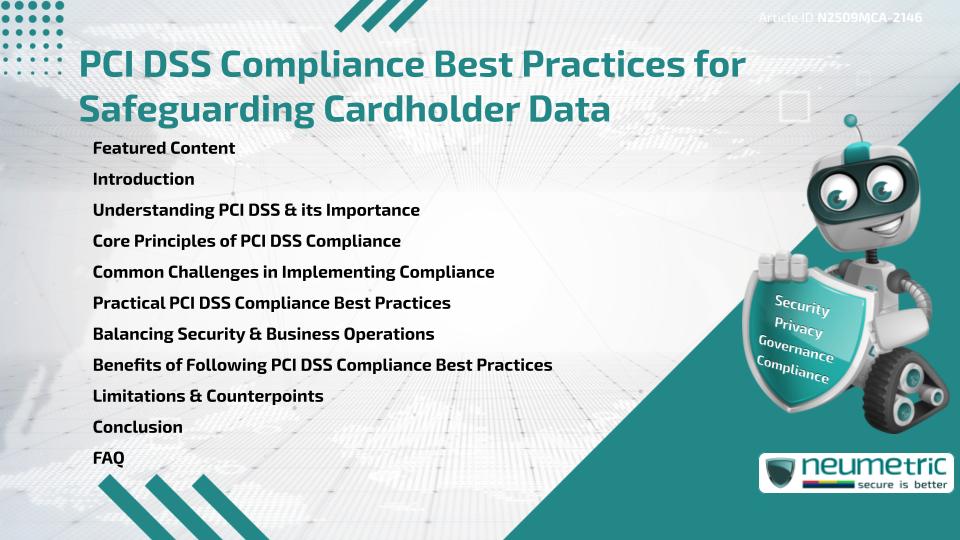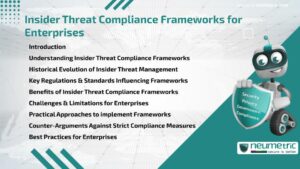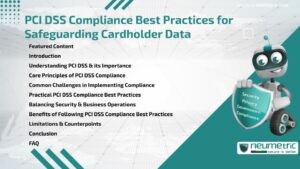Table of Contents
ToggleIntroduction
Payment Card Industry Data Security Standard [PCI DSS] compliance is a mandatory Framework that helps Organisations secure Payment Card Data & prevent breaches. Adopting PCI DSS Compliance Best Practices is not only about meeting regulatory obligations but also about protecting sensitive Cardholder Data, maintaining Customer Trust & reducing costly Risks. These practices include strengthening network security, monitoring Access Controls, encrypting Cardholder Information & conducting regular assessments. While businesses often face challenges in implementation, understanding the Core Principles & adopting practical measures can ensure that compliance becomes a continuous & effective process.
Understanding PCI DSS & its Importance
PCI DSS was established by major card brands to create a unified set of security requirements for handling payment card data. It is applicable to Merchants, Service Providers & any Company that stores, processes, transmits Cardholder Information. The Standard is designed to prevent fraud & ensure secure transactions. Non-compliance can result in heavy fines, reputational damage & loss of Customer confidence. You can read more about the origins of PCI DSS at the PCI Security Standards Council.
Core Principles of PCI DSS Compliance
The PCI DSS Framework is based on six (6) major requirements. These include building secure networks, protecting stored Cardholder Data, maintaining strong Access Controls, monitoring & testing systems & ensuring proper Information Security Policies. In practice, these requirements function like a security blueprint, guiding Organisations in creating a strong environment for cardholder protection. More details on these principles can be found in the Official PCI DSS Quick Reference Guide.
Common Challenges in Implementing Compliance
Many Organisations struggle with resource limitations, technical complexity & maintaining compliance over time. Small Businesses may lack dedicated security teams, while larger enterprises often face integration challenges across multiple systems. In addition, frequent updates to the PCI DSS requirements can make it difficult for companies to stay aligned. Failure to address these challenges can leave gaps that malicious actors exploit. For insights into common challenges, see the analysis from TechTarget on PCI DSS.
Practical PCI DSS Compliance Best Practices
Adopting PCI DSS Compliance Best Practices requires both technical & organizational measures. Some key strategies include:
- Network Segmentation: Separating Cardholder Data environments from other networks.
- Encryption: Using strong cryptographic methods to protect data during transmission & storage.
- Access Controls: Implementing strict role-based permissions & two-factor authentication.
- Regular Monitoring: Conducting audits, penetration tests & log reviews.
- Employee Training: Raising awareness to minimise human error & insider Threats.
These practices transform compliance from a one-time task into a culture of Continuous Improvement. The National Institute of Standards & Technology offers helpful guidance on encryption & Access Control measures.
Balancing Security & Business Operations
Businesses must balance security requirements with operational efficiency. For instance, overly strict controls may slow down transaction processes, while lax security invites breaches. Using automated compliance tools & managed services can ease this tension, allowing Organisations to remain secure without hindering performance. Striking the right balance ensures that compliance supports rather than obstructs business goals.
Benefits of Following PCI DSS Compliance Best Practices
When Organisations follow PCI DSS Compliance Best Practices, they gain multiple benefits: reduced Risk of data breaches, avoidance of penalties, improved brand reputation & greater Customer Trust. A compliant company demonstrates that it prioritizes security, which can be a competitive advantage. Customers are more likely to trust businesses that protect their Sensitive Data. For more information, the Federal Trade Commission provides resources on safeguarding consumer information.
Limitations & Counterpoints
While PCI DSS provides strong guidelines, it is not a guarantee against all attacks. Cyber Threats evolve rapidly & compliance may lag behind emerging Risks. Additionally, smaller Organisations may find compliance costly or resource-intensive. However, the benefits of safeguarding Cardholder Data generally outweigh these challenges, as breaches can lead to severe consequences.
Conclusion
PCI DSS Compliance is essential for protecting Cardholder Data & maintaining Customer Trust. By following PCI DSS Compliance Best Practices, Organisations can create a strong foundation of security, balance operational needs & reduce the Risk of costly breaches. While implementation challenges exist, adopting a proactive & continuous approach to compliance ensures better protection for both businesses & consumers.
Takeaways
- PCI DSS Compliance protects Cardholder Data & strengthens Customer Trust.
- Best Practices include encryption, Access Controls, monitoring & training.
- Businesses must balance security with operational efficiency.
- Compliance is an ongoing process & not a one-time process.
FAQ
What is PCI DSS Compliance?
PCI DSS Compliance refers to meeting the security requirements established by the Payment Card Industry to protect Cardholder Data.
Why are PCI DSS Compliance Best Practices important?
They minimise the Risk of breaches, protect Customer Trust & ensure businesses avoid costly fines.
Who needs to follow PCI DSS Compliance?
Any Company that processes, stores or transmits Cardholder Data need to comply with PCI DSS Standard.
How often should businesses review their PCI DSS Compliance?
Businesses should review compliance continuously, with formal assessments at least once every year.
Can Small Businesses afford PCI DSS Compliance?
While it may seem costly, scalable tools & managed services help Small Businesses achieve compliance effectively.
Does PCI DSS Compliance guarantee security?
No, compliance reduces Risks significantly but does not guarantee protection against all Cyber Threats.
What happens if a business fails to comply with PCI DSS?
Non Compliance will result in penalties, greater transaction fees & reputational damage.
References
- PCI Security Standards Council
- Official PCI DSS Quick Reference Guide
- TechTarget on PCI DSS
- National Institute of Standards & Technology
- Federal Trade Commission
Need help for Security, Privacy, Governance & VAPT?
Neumetric provides organisations the necessary help to achieve their Cybersecurity, Compliance, Governance, Privacy, Certifications & Pentesting needs.
Organisations & Businesses, specifically those which provide SaaS & AI Solutions in the Fintech, BFSI & other regulated sectors, usually need a Cybersecurity Partner for meeting & maintaining the ongoing Security & Privacy needs & requirements of their Enterprise Clients & Privacy conscious Customers.
SOC 2, ISO 27001, ISO 42001, NIST, HIPAA, HECVAT, EU GDPR are some of the Frameworks that are served by Fusion – a SaaS, multimodular, multitenant, centralised, automated, Cybersecurity & Compliance Management system.
Neumetric also provides Expert Services for technical security which covers VAPT for Web Applications, APIs, iOS & Android Mobile Apps, Security Testing for AWS & other Cloud Environments & Cloud Infrastructure & other similar scopes.
Reach out to us by Email or filling out the Contact Form…





